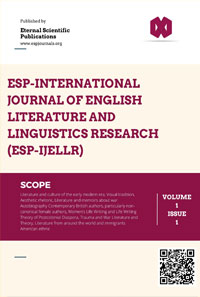ESP International Journal of English Literature and Linguistics Research (ESP-IJELLR)
Citation :
Aishwarya B, Gopika P, 2025. "Women’s Writing in Postcolonial Literature: Voice, Agency and Resistance" ESP-International Journal of English Literature and Linguistics Research (ESP- IJELLR) Volume 3, Issue 2: 9-15.
Abstract :
Postcolonial literature has always been a locale for the analysis of the long-standing effects of colonization, which includes social-cultural, political and economic repercussions that previously colonized societies had to confront. There is a particular role for women's writing here, as it brings to the foreground the relationship between gender and identity in colonial power structures. Female writers writing from postcolonial sites, aside from narrating individual and collective histories of marginalization, are contributing in complex ways to the processes through which social and cultural agency is reclaimed. Amid the legacy of colonial and patriarchal oppression that has been entrenched in such communities, their works draw portraits of women navigating complex social systems, battling against male dominance, and asserting themselves on multiple fronts. This essay discusses how postcolonial women writers adopt literature as a strategy of agency, resistance, and empowerment. This volume reveals how women's writing in their literature undercuts dominant discourses, reinvents ideas about the self and bypasses restrictive social norms by exploring texts written by African, South Asian and Caribbean writers. Female writers are providing sites for self-representation, by formulating experiences that would otherwise be silenced, transgressing norms and transforming established roles of gender. Moreover, their writing often plays with literary forms such as hybridity, multilingualism and non-linearity of narrative, which serve as formal strategies of resistance against colonial remains and Eurocentric notions of literature.The idea of agency is also explored in the research, where postcolonial women use literature as a tool to gain power and independence within inflexible social structures. The characters in these stories claim forms of collective and individuated power through resilience, tactical bargaining, and self-possession. Women’s writing also serves as a form of resistance, challenging institutional and cultural norms, exposing long-established injustice and protesting systemic injustice. The study concludes that women's involvement with postcolonial literature is inhibitive to understanding the manner in which colonialism and gender conflicts are linked as well as in reenvisioning notions of social transformation and empowerment. All in all, the research stresses that women writing (in) postcolonial context is more than a matter of literary representation, but an active transformative work that resists oppression, amplifies submerged voices and pursues social cultural and political change. Postcolonial women writers are challenging conventional notions of what it means to write as a woman in a postcolonial world, by re-inscribing voice, agency and resistance.
References :
[1] Spivak, G. C. (1988). Can the Subaltern Speak?
[2] Mohanty, C. T. (2003). Feminism Without Borders: Decolonizing Theory, Practicing Solidarity.
[3] Emecheta, B. (1979). The Joys of Motherhood.
[4] Dangarembga, T. (1988). Nervous Conditions.
[5] Kincaid, J. (1988). Annie John.
[6] Roy, A. (1997). The God of Small Things.
[7] El Saadawi, N. (1975). Woman at Point Zero.
[8] Das, K. (1976). My Story.
[9] Ashcroft, B., Griffiths, G., & Tiffin, H. (2002). The Empire Writes Back: Theory and Practice in Post-Colonial Literatures.
[10] Shohat, E., & Stam, R. (1994). Unthinking Eurocentrism: Multiculturalism and the Media.
[11] Moi, T. (2002). Sexual/Textual Politics: Feminist Literary Theory.
[12] Walcott, D. (1990). Omeros.
[13] Irigaray, L. (1985). This Sex Which Is Not One.
[14] Cixous, H. (1976). The Laugh of the Medusa.
[15] Hall, S. (1996). Cultural Identity and Diaspora.
[16] Bhabha, H. K. (1994). The Location of Culture.
[17] Narayan, U. (1997). Dislocating Cultures: Identities, Traditions, and Third World Feminism.
[18] Loomba, A. (2005). Colonialism/Postcolonialism.
[19] Nasta, S. (2002). Motherlands: Black Women’s Writing from Africa, the Caribbean, and South Asia.
[20] Sen, A. (1999). Development as Freedom.
Keywords :
Patriarchy, Literary Activism, Women's Literature, Postcolonial Writing, Gender, Voice, Agency Resisterism and Identity and Empowerment.


 :10.56472/25842773/IJELLR-V3I2P102
:10.56472/25842773/IJELLR-V3I2P102